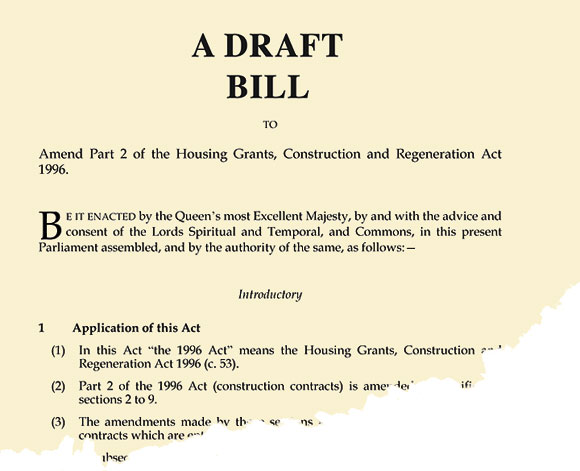Technical
Payment provisions still disappoint
The long awaited consultation paper from the Department of Trade and Industry (DTI) on reform of the Construction Act has now been published. BCSA Legal Director Marion Rich analyses what it means for specialist contractors.
At last we have the consultation paper from the Department of Trade and Industry (DTI) on the Construction Act.
You will remember, I am sure – see my article in New Steel Construction volume 12 number 5 of September/October 2004 – that a Review of the Construction Act was announced by the Chancellor of the Exchequer in the Budget papers last year and was carried out by a Review Group headed by Sir Michael Latham under the auspices of Nigel Griffiths MP, Construction Minister at DTI. Task groups looked at payment and adjudication and reported to the Review Group in September 2004. Sir Michael in turn reported to the minister. The awaited DTI consultation paper was finally published just before Easter this year. It relates to England and Wales only at the moment.
So how does the consultation paper match up to the Review? The main thrust of the Review is to do with improving payment in the construction industry, so payment is the place to start.
PAYMENT
Proposals on payment
The Specialist Engineering Contractors’ Group (SECG), of which BCSA is a member, believes that the most important thing that this Review should achieve is to ensure that a debt crystallises by the final date for each payment. This is what the Act originally set out to achieve by introducing in s.110 of the Act the concept of ‘adequate mechanism’ and the requirement for a payment notice. However, it is now clear that, even when a s.110 notice is served, a debt is not necessarily established. The right of suspension in s.112 and withholding under s.111 (insofar as it relates to set off) are both predicated upon there being a debt.
The consultation paper proposes dropping the need for a s.110 notice and setting out the elements of an adequate mechanism for payment. It also proposes giving the payee a statutory right to make an application. The trouble is that it is not possible to see how these proposals would ensure debt crystallisation: DTI’s ‘default’ option is to adjudicate. Adjudication should not be part of the normal payment process.
During the Review, SECG proposed the following simple procedure:
- The payee to have a statutory right to apply for payment in respect of the work and services to be provided under the contract;
- The payer to have a right to challenge the amount applied for by the issue of a withholding notice before final date for payment;
- The amount in the payee’s application or the difference between that amount and any lesser amount withheld shall constitute a debt at the final date for payment.
This seems to be clear, simple and fair to both payer and payee.
It was also proposed during the Review that withholding notices should contain detail of the reasons and calculations behind the withholding; DTI does not agree to this but has proposed that the amount remaining to be paid after withholding should be notified. This is useful as far as it goes but it does not go far enough.
Conditional Payment Provisions
BCSA members have been saying for some years now that ‘pay when certified’ clauses are more and more frequently being used to mitigate the effect of the outlawing of general pay when paid clauses. SECG proposed that all conditional payment clauses should be banned – including both pay when certified clauses and clauses providing for pay when paid in the event of third party insolvency, currently allowed under the Act.
The consultation paper rightly sets out the arguments against pay when certified clauses. However, it lacks the courage of its convictions and proposes that ‘pay when certified’ clauses should fulfill the criteria of an adequate mechanism under certain conditions that do not seem to address the main problem with pay when certified – that a subcontractor has no remedy where the certification procedure breaks down.
As an alternative, DTI put forward the possibility of guidance to subcontractors so that parties can then negotiate. I find it touching the faith that politicians and civil servants always seem to put in the power of guidance to change behaviour.
As far as pay when paid in the event of third party payer insolvency is concerned, DTI proposes to maintain the status quo in the absence of what it calls ‘clear evidence that the removal the current exception would [deliver a fairer outcome than the current legislation]’.
Reimbursement for the costs of suspension and additional time for remobilisation
DTI has agreed that these should be a statutory right when s.112 is exercised. This is good. It carries on to suggest that the Scheme should contain a fall-back position where the contract does not set out rights – and proposes a maximum of 5% of the value of payment outstanding and a maximum of 7 days for remobilisation. However, an artificial maximum is not very helpful.
Making contractual provisions on cross contract set-off inefective
The consultation paper proposes making provisions on cross contract set-off ineffective whilst retaining equitable set-off. This would be a good move.
Allowing stage payments under the Scheme for Construction Contracts to be made for materials in advance of their arrival on site
Subject to safeguards, for instance, ensuring that title passes, the consultation paper proposes to amend the Scheme to allow stage payments. No doubt this is good as far as it goes but the Scheme can easily be ignored or amended. Thus the proposal will do little to address the situation in which many BCSA members find themselves, that they have expended 80 or 90% of their costs before thay arrive on site. What is required is an amendment to s.109 to give a start date for instalments.
Payment proposals upon which DTI has declined to consult
For one of these issues, costs, DTI has already agreed to legislative change. The basic position will be that parties should bear their own costs. Any agreement in the contract to any other effect will be ineffective. However, adjudicators will be obliged to deal with costs where both parties ask for costs after the reference has been made.
There are two further payment issues, both of great importance for specialist contractors upon which DTI has not consulted: proposals for insolvency protection and limit on length of payment periods. This appears to be because construction is not allowed to be a special case. This is strange as it already is a special case – it has its own dedicated legislation in the shape of the Act. In many other jurisdictions – in Europe, North America and Australia – construction is treated as a special case with protection against the risk of insolvency. As far as a limit on the length of payment periods is concerned, it seems clear that payment periods are being extended in order to limit the effectiveness of the Act. That is a good reason for having a ‘long stop’ period.
ADJUDICATION
Trustee stakeholder accounts
It is not infrequent to see contractual provisions requiring adjudicators to order payement of sums the subject of an adjudication decision into a trustee stakeholder account, often until the end of the project. DTI has agreed that such provisions should be ineffective, with an exception under the scheme in circumstances where the receiving party is involved in insolvency proceedings that will require the adjudicator to act as trustee, perhaps for a long time. Will adjudicators want this role? Who will pay?
Adjudicator’s power to rule on own jurisdiction and right to payment when adjudicator stands down for lack of jurisdiction’
DTI agrees that adjudicators should be given power to rule on their own jurisdiction in certain matters. This will certainly save costs and time in challenges to jurisdiction. The matters over DTI proposes to give adjudicators such power are largely sensible but with some odd exceptions:
- whether there is a contract
- whether a contract is in writing for the purposes of s.107
- whether the contract is with a residential occupier or is of another excluded description (s.106 is specifically excluded from the adjudicator’s remit).
DTI proposes that there should be a clear right for adjudicators to be paid if they stand down for lack of jurisdiction although it is arguable that such a right already exists.
Providing the adjudicator with the power to re-open ‘final and conclusive’ decisions
The exclusion from the adjudicator’s jurisdiction under the Scheme of certificates and decisions stated to be ‘final and conclusive’ (paragraph 20(a)) was inserted to deal with Final Certificates under JCT contracts. The trouble is that over the years, all sorts of things appear in contracts under the banner of being ‘final and conclusive’: interim valuations, extensions of time, health and safety issues. DTI proposes to amend the Act (not merely the Scheme) to allow adjudicators to ‘open up, review and revise’ any decision or certificate, subject to the exception currently in the Scheme. This exception would be subject to a new qualification that the decision or certificate is ‘of substance to a non-interim payment’ (this would be for the adjudicator to decide). This helps to some extent but does not seem to deal with non-payment decisions.
Adjudication and other matters upon which DTI has declined to consult
Some of these are among the most important for contractors:
• Single adjudication procedure There was a large degree of consensus among the industry, both at the first review of adjudication and during this Review, that there should be only one adjudication procedure, as is the case in other jurisdictions that have similar legislation (New Zealand, Singapore, some Australian states). One procedure makes life simpler for all parties and avoids unnecessary arguments with their concomitant cost.
• Mitigation of the effects of the decision in RJT Consulting Engineers v DM Engineering This is the case that radically altered our understanding of s.107 of the Act. S.107 provides that a construction contract has to be in writing for the Act to apply and goes on to define what ‘in writing’ means. The Court of Appeal decided that all the terms of the contract (or at least all relevant terms) must be in writing. In the construction industry, contracts often do not have everything set out neatly in writing and it is naïve to think that this is suddenly going to happen. This interpretation of s.107 could mean that large numbers of contractors find themselves with no right to adjudicate their disputes. DTI however regards the interpretation of the Court of Appeal as ‘appropriate in the context of adjudication’, despite the fact that a large majority of the representatives of the construction industry appear to disagree.
• Amendments to the scope of the legislation This covers three issues, exclusion of head contracts under PFI, exclusion of contracts with residential occupiers and revision to the exclusion of process plant. On PFI, DTI’s view appears to be that these contracts are far removed from traditional construction contracts and that there are no major problems. With regard to residential occupiers, the reasoning is that adjudication would represent an unwanted shift in balance away from the customer and towards the industry. This is debatable!
The most important item in this category is the refusal even to consult on bringing the process plant industry into the scope of the Act. There has been considerable litigation to try and decide exactly what is within scope and what is not. This is a major difficulty for thousands of small companies for which litigation is an expensive burden.
OTHER ISSUES
The consultation paper also deals with a number of other matters relating to adjudication generally and to the Scheme in particular that are probably of more immediate relevance to adjudicators than they are to BCSA members.
CONCLUSION
The consultation paper, while certainly comprehensive, is disappointing in many respects. The Act has never worked quite as intended from the start. We have been – thanks in part to a great deal of work on the part of BCSA and its SECG colleagues – given an opportunity to put things right. The Review will shape how the Act works for the next 10 or 20 years. It would be a great shame not to make the Act as perfect as possible while we have that chance. I hope that as many interested parties as possible will help DTI to achieve this by responding to the consultation paper.











